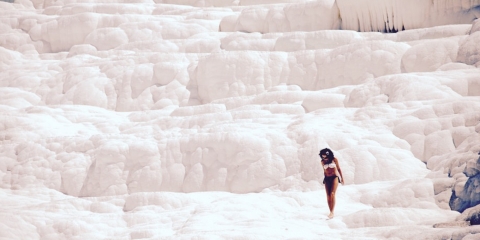The Cotton Castle
Ever yearned to bathe in an infinity pool looking up at a cerulean Aegean sky and down at 2,000-year-old Roman and Greek antiquities?
The opaque chalk cliffs above Pamukkale, Turkey, are nature’s answer. Formed by the elevated concentration of calcium carbonate deposits flowing down from the mountain’s seventeen subterranean hot springs. The vast Travertine pools above Pammukale resemble steaming, mirror-like hot tubs carved out of the cliff-face.
Pamukkale is a natural site in southwestern Turkey. The city contains hot springs and travertines formed in terraces of carbonate minerals left by the running water. Pamukkale is located in Turkey’s Inner Aegean area, in the River Menderes valley, which has a warm climate year-round.
Locals have named this natural architectural wonder the “cotton castle” of Turkey, owing to the cloud-like appearance of the white terraces, but its real appeal is the declared health-giving properties of the mineral spring-fed water that at 94°F, is relatively refreshing. Visitors come from far and wide to benefit from the large concentration of minerals in the water, which are said to alleviate blood circulation disorders and high blood pressure.
Tourism is and has been a major industry for Pamukkale. People have bathed in its pools for numerous years. As recently as the mid-XX Century, hotels were built over the ruins of the nearby city of Hierapolis, causing significant damage. A road was built from the valley over the terraces, and motorbikes were allowed to go up and down the slopes. In 1988, when the area was declared a World Heritage Site, the hotels were demolished, and the road replaced with artificial pools.
If you are up for the trip, keep in mind wearing shoes in the water is prohibited to protect the deposits.
Tags: Bath, Natural Thermal Baths, Personal Care, Skin Care, Thermal Baths


